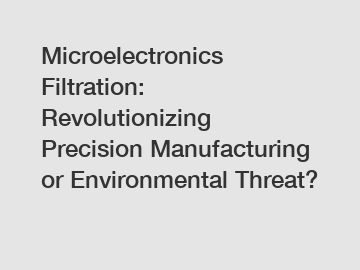Microelectronics Filtration: Revolutionizing Precision Manufacturing or Environmental Threat?
Microelectronics, a rapidly evolving field, is responsible for powering our modern world. From smartphones to smartwatches, from sophisticated healthcare devices to renewable energy systems - the list is endless. However, behind the scenes of this revolution, lies an often overlooked aspect: microelectronics filtration. While it undoubtedly ensures precision manufacturing, there are increasing concerns about its potential environmental impact. In this blog, we will explore both sides of the story and delve into the benefits and risks associated with this essential process.
1. The Revolution of Precision Manufacturing:
Microelectronics filtration plays a pivotal role in the precision manufacturing of electronic devices. The process involves removing contaminants, particles, and impurities during various stages of fabrication, enabling the creation of high-quality microchips and electronic components. Filtration ensures that only error-free, reliable, and efficient products reach the market, meeting stringent quality standards.

2. Enhanced Product Performance:
Microelectronics filtration ensures the production of reliable and durable devices. It helps to prevent damage and malfunction caused by incoming contaminants during the manufacturing process. By eliminating contaminants, microscopic flaws, and impurities, microelectronics filtration enhances product performance, longevity, and overall quality. This allows manufacturers to deliver high-caliber solutions that exceed consumer expectations.
3. Eco-Friendly Manufacturing:
Precision manufacturing embraces an eco-conscious approach by focusing on reducing waste and optimizing energy consumption. Microelectronics filtration is an integral part of this green movement. By filtering and reusing certain materials within the manufacturing process, it minimizes waste and reduces the demand for fresh raw materials. Furthermore, efficient filtration systems contribute to a cleaner manufacturing environment by ensuring harmful particles are not released into the atmosphere.
4. Environmental Concerns:
While microelectronics filtration holds tremendous benefits for precision manufacturing, it is essential to recognize and address the potential environmental threats associated with it. One primary concern is the disposal of filtration materials, which often contain hazardous substances. If not handled responsibly, these materials can pollute the environment and pose risks to human health. Manufacturers must adopt sustainable waste management practices to minimize these adverse impacts.
5. Sustainable Innovations:
To mitigate environmental concerns, scientists and engineers are continuously exploring sustainable solutions for microelectronics filtration. Research is underway to develop advanced filtration techniques that consume less energy and generate fewer waste materials. Several companies are already investing in eco-friendly filtration systems that aim to strike a balance between precision manufacturing and environmental sustainability. As technology advances, we have hope for a greener future in microelectronics manufacturing.
6. Regulatory Framework:
To safeguard the environment and public health, stringent regulations are being implemented worldwide to control the disposal and management of filtration materials. Government bodies and industry associations are working together to establish standards and safety guidelines for microelectronics filtration processes. Through compliance and responsible corporate practices, the industry can aim for eco-friendliness without compromising on efficient manufacturing.
Conclusion:
Microelectronics filtration plays a vital role in revolutionizing precision manufacturing. It guarantees the production of high-quality electronic devices while promoting eco-friendly practices. However, we must remain cautious about its potential environmental threats and actively pursue sustainable innovations. By implementing stringent regulations, responsible waste management, and ongoing research, we can strike a balance between precision manufacturing and environmental preservation.
In this evolving field, the importance of microelectronics filtration cannot be undermined. Through continuous improvements and a collective commitment to sustainability, we can ensure that the advancement of precision manufacturing coexists harmoniously with environmental protection.
If you want to learn more, please visit our website powder sintered filters, high temperature sintered powder metal filter, sparger line.
228
0
0


Comments
All Comments (0)